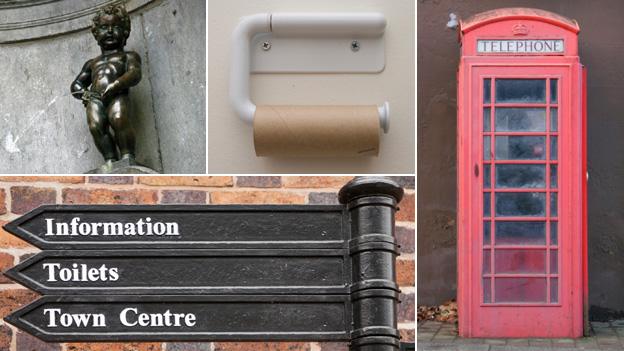Is urinating in public ever acceptable?
- Published
- comments

A court ruling has cast doubt on whether urinating in public is a nuisance - as long as no-one sees. So is it really ever acceptable?
You are driving along an unfamiliar country road. An urgent dilemma nags at both your bladder and your conscience.
With no public toilets in sight, do you carry on in discomfort? Or do you find somewhere discreet to pull over?
While the cultural aversion to performing basic bodily functions in the open air is widespread, all too often it is tested by immediate physical pressures.
The rights and wrongs of this quandary have been tested in court after a couple in Somerset, John and Cherry Pusey, tried to force their local council to close a lay-by near their home which passing motorists regularly used for open-air "comfort breaks".

This is a urinal...
However, Lord Justice Ward - sitting with Lords Justice Longmore and Patten at the Court of Appeal - ruled that the urinating drivers' impact was not "cumulatively intolerable" because they were not "obviously visible" from the Puseys' home, according to reports.
But whatever the legal position, not everyone will be convinced that this represents a factor in mitigation.
The spectacle of drunken revellers fouling town centres in the early hours of weekends is regularly held up as a symptom of societal decline.
There was widespread public anger at student Philip Laing, caught urinating on a Sheffield war memorial in 2009. And the practice can be deemed "disorderly behaviour" in England and Wales, an offence punishable with a fine under the 1986 Public Order Act.
Local authorities in Chester launched a crackdown after fears that well-refreshed revellers were causing irreparable damage to the city's medieval walkways.

... this is not...
Even Paris, home of the pissoir, launched a high-profile, all-out crackdown on outdoor urination.
Environmental concerns have also driven the fight against al fresco relief. Researchers in Germany believe swimmers passing water into Eichbaum lake, Hamburg, are partly responsible for an algae bloom that killed more than 500 fish.
For this reason, the Glastonbury Festival regularly deploys a "green police" force which threatens revellers with expulsion if they fail to use toilets, amid fears that excess urination could affect the local water, polluting rivers and streams.
The zero-tolerance stance is backed by Raymond Boyd Martin, managing director of the British Toilet Association, which represents the UK lavatory industry.

... nor is this. Urinating here could get you arrested
Boyd-Martin accepts that allowances should be made for the elderly and those with medical complaints - but otherwise, he believes, the practice should never be condoned.
"It's always anti-social," he says. "It has to be wrong in this day and age. There's no reason in the 21st Century we should have to do this.
"If you are making a journey you should be planning where and when you are going to stop - in restaurants, in hotels or in petrol stations.
"At the end of the day it's about decency. This is someone exposing themselves in a public place."
Nonetheless, anyone with a small child knows how difficult locating a toilet at any given time can be.
Urban planners at the University of the West of England estimate that the UK has lost 40% of its public toilets in the past decade, a process that has been exacerbated by local authority budget cuts. In Manchester, the number of civic conveniences went from 19 to one.
At the same time, many people remain shy of using facilities in pubs, restaurants and shops of which they are not a customer.
Quentin Willson, motoring journalist and former Top Gear presenter, insists he has nothing to be ashamed of when he pulls over to use a lay-by.
On smaller roads where there are few roadside services, he says, they could be a life-saver.
"I would much rather have people weeing in them than carrying on driving and not being able to concentrate," he argues.
"I wouldn't go out to do it publicly, where there were a lot of people around. I'd find a bush or go into a field. Lay-bys are a fantastic British tradition."
Few philosophy textbooks have tackled this ethical conundrum. But millions have wrestled with it, on a highway far from home.